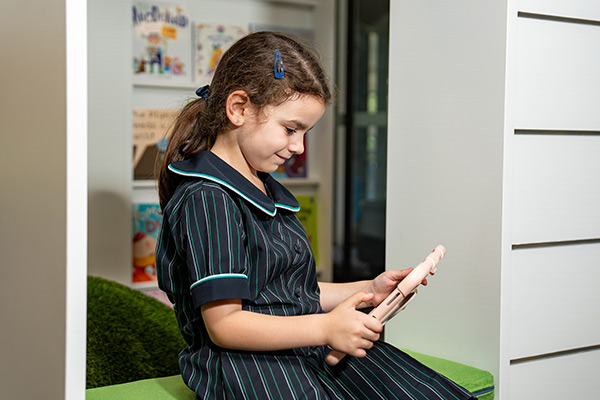By connecting to the real world of students’ lives, authentic learning enables students to become lifelong learners who contribute to society and the wider world as active and discerning citizens. Authentic learning is central to our work as Catholic educators because it promotes the continual growth and wellbeing of the whole person — spiritually, intellectually, emotionally, socially and physically.
 Fundamental to our existence is ensuring that all students are nurtured in their faith through strong positive relationships based on the teachings of Jesus, an explicit and engaging Religious Education curriculum and the vibrant liturgical life of the school.
Fundamental to our existence is ensuring that all students are nurtured in their faith through strong positive relationships based on the teachings of Jesus, an explicit and engaging Religious Education curriculum and the vibrant liturgical life of the school.
The wellbeing of each student underpins all teaching and learning. It is essential that teachers build effective relationships with their students and assist students to have positive relationships with their peers in order to develop a sense of belonging to the St Michael’s School community.
Quality Teaching
At St Michael’s we believe that highly effective teachers:
- Establish and teach classroom rules and routines, reinforce positive behaviour and provide clear and appropriate consequences for misbehaviour.
- Plan teaching programs that are designed to engage students in their learning and provide appropriate adjustments for all learners.
- Explicitly teach with clear learning intentions and success criteria.
- Use teaching and learning practices that are research based.
- Use technology as a tool to enhance learning.
- Give feedback to students that is specific and focuses on effort, process and self-regulation.
- Evaluate their teaching and are open and willing to adopt new ideas.
- Participate in, and contribute to, meaningful and ongoing professional development.
- Foster professional, positive relationships with parents in order to maintain clear communication around student behaviour, social and emotional wellbeing and learning.
Quality Assessment
At St Michael’s we believe that highly effective assessment practices are:
- An ongoing source of information for teachers to guide and direct students.
- An opportunity for teachers to reflect on the effectiveness of their own teaching practice.
- Valued, understood and implemented across the whole school community.
At St Michael’s we believe that highly effective assessment practices include:
- Strategies that are diverse and tailored to meet the needs of each student.
- Analysis of data and purposeful feedback that informs future teaching and learning.
- The use of clear success criteria to measure student achievement.
- Regular opportunities to communicate with parents through formal and informal means.
Priority Student Learning Processes
At St Michael’s we believe that quality learning occurs for our students when they:
- Feel emotionally and physically safe and secure and their wellbeing has been responded to appropriately.
- Have high expectations of themselves that are reflected in goal setting with their teachers and parents.
- Engage in work that is appropriately challenging.
- Work individually and in collaboration with others.
- Make connections between the material being learned and their own lives and experiences.
- Have opportunities to ask questions, make choices and self-reflect.
- Receive and respond to feedback from their teachers and their peers.
Discover Our New Learning & Wellbeing Framework!
We’re excited to introduce our new Learning & Wellbeing Framework, designed to support every student’s growth and success. This framework outlines our commitment to academic excellence, student wellbeing, and a nurturing school environment.
